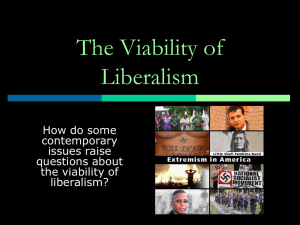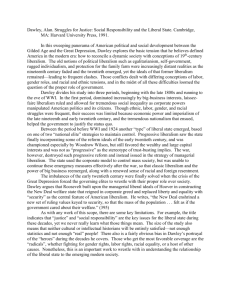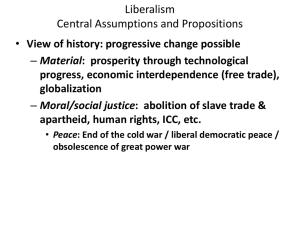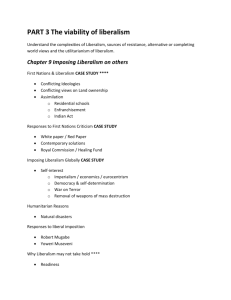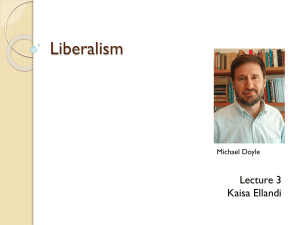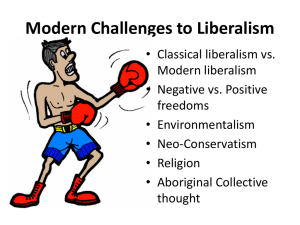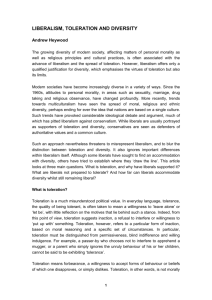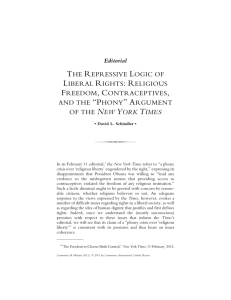- Department of Political Science
advertisement
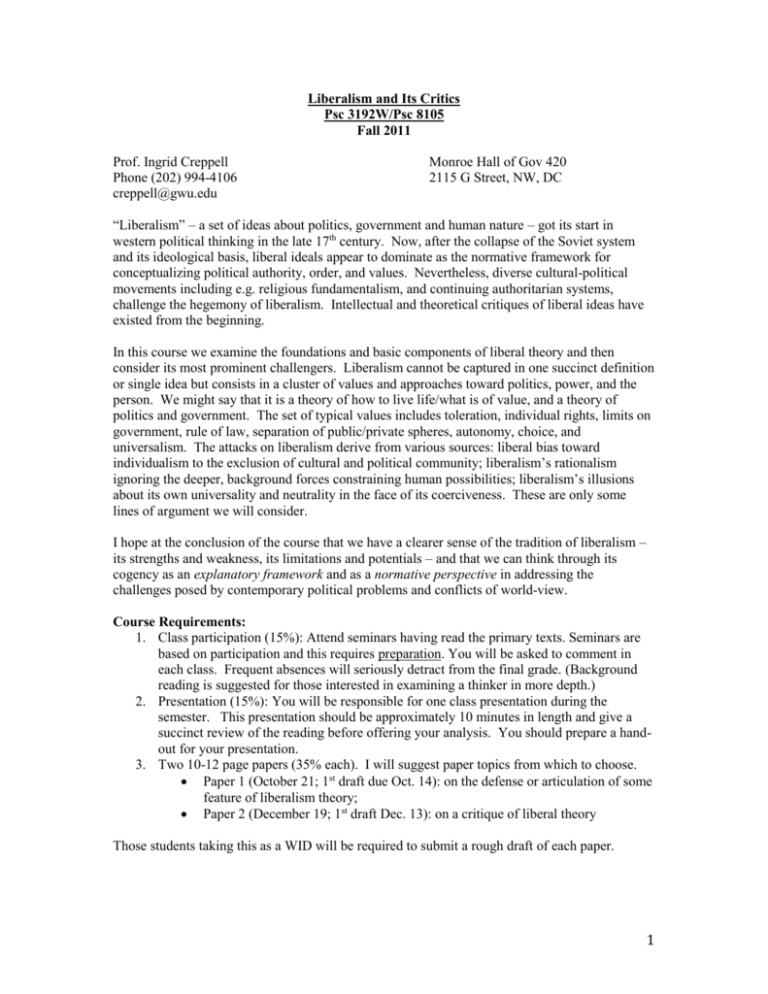
Liberalism and Its Critics Psc 3192W/Psc 8105 Fall 2011 Prof. Ingrid Creppell Phone (202) 994-4106 creppell@gwu.edu Monroe Hall of Gov 420 2115 G Street, NW, DC “Liberalism” – a set of ideas about politics, government and human nature – got its start in western political thinking in the late 17th century. Now, after the collapse of the Soviet system and its ideological basis, liberal ideals appear to dominate as the normative framework for conceptualizing political authority, order, and values. Nevertheless, diverse cultural-political movements including e.g. religious fundamentalism, and continuing authoritarian systems, challenge the hegemony of liberalism. Intellectual and theoretical critiques of liberal ideas have existed from the beginning. In this course we examine the foundations and basic components of liberal theory and then consider its most prominent challengers. Liberalism cannot be captured in one succinct definition or single idea but consists in a cluster of values and approaches toward politics, power, and the person. We might say that it is a theory of how to live life/what is of value, and a theory of politics and government. The set of typical values includes toleration, individual rights, limits on government, rule of law, separation of public/private spheres, autonomy, choice, and universalism. The attacks on liberalism derive from various sources: liberal bias toward individualism to the exclusion of cultural and political community; liberalism’s rationalism ignoring the deeper, background forces constraining human possibilities; liberalism’s illusions about its own universality and neutrality in the face of its coerciveness. These are only some lines of argument we will consider. I hope at the conclusion of the course that we have a clearer sense of the tradition of liberalism – its strengths and weakness, its limitations and potentials – and that we can think through its cogency as an explanatory framework and as a normative perspective in addressing the challenges posed by contemporary political problems and conflicts of world-view. Course Requirements: 1. Class participation (15%): Attend seminars having read the primary texts. Seminars are based on participation and this requires preparation. You will be asked to comment in each class. Frequent absences will seriously detract from the final grade. (Background reading is suggested for those interested in examining a thinker in more depth.) 2. Presentation (15%): You will be responsible for one class presentation during the semester. This presentation should be approximately 10 minutes in length and give a succinct review of the reading before offering your analysis. You should prepare a handout for your presentation. 3. Two 10-12 page papers (35% each). I will suggest paper topics from which to choose. Paper 1 (October 21; 1st draft due Oct. 14): on the defense or articulation of some feature of liberalism theory; Paper 2 (December 19; 1st draft Dec. 13): on a critique of liberal theory Those students taking this as a WID will be required to submit a rough draft of each paper. 1 Learning Outcomes: 1. Be able to situate the foundations of liberal thought in historical and conceptual context. 2. Understand the core components of “liberal theory” and the major theoretical controversies pertaining to them: toleration, freedom, equality, rights, justice, etc. 3. Identify the major reactions against liberal theory and their arguments. 4. Demonstrate competency in analyzing and critiquing texts in political theory. 5. Demonstrate capacity to ask theoretical and ethical questions about political principles. The following books are available for purchase: Locke on Toleration, Cambridge University Press, 2010 (Hackett edition also fine) Locke, Two Treatises of Government, Cambridge University Press, 1988 Mill, On Liberty, Cambridge University Press, 1989 Nietzsche, On the Genealogy of Morality, Cambridge University Press, 2006 Foucault, Discipline and Punish, Vintage Books, 1995 Rawls, Justice as Fairness, Harvard University Press, 2001 Schmitt, The Concept of the Political, University of Chicago Press, 1996/2007 8/30 Intro: What is liberalism? Classical Foundations I 9/6 Religious pluralism Locke: Letter Concerning Toleration (1689) Background reading: Ruth Grant, John Locke’s Liberalism, Chicago, 1987. John Horton & Susan Mendus, eds. A Letter Concerning Toleration in focus, Routledge, 1991. Ingrid Creppell, “Locke on Toleration: The Transformation of Constraint,” Political Theory, May 1996. 9/13 Limited government & property rights Locke: Second Treatise of Government (1689) Background reading: Richard Ashcraft, Revolutionary Politics & Locke’s Two Treatises of Government, Princeton UP, 1986. James Tully, An Approach to Political Philosophy: Locke in Contexts, Cambridge UP, 1993. Classical Foundations II 9/20 Progress, autonomy, individuality, anti-paternalism Kant: What is Enlightenment? (1784) (hand-out) Mill, On Liberty, (1859) Ch. 1-4 Background reading: John Christian Laursen, “The Subversive Kant,” Political Theory, Vol. 14, 4. (Nov., 1986) Elizabeth Ellis, Kant's Politics: Provisional Theory for an Uncertain World, Yale UP, 2005. Jonathan Riley, Mill on Liberty, Routledge, 1998. 2 Contemporary Foundations 9/27 Negative freedoms Berlin, Two Concepts of Liberty (1958) (e-reserves) Shklar, Liberalism of Fear (1989) (e-reserves) Background reading: John Gray, Isaiah Berlin, Princeton UP, 1996. Bernard Yack, Liberalism Without Illusions, U. of Chicago Press, 1996. 10/4 Egalitarianism Rawls, Justice as Fairness (2001) Background reading: Samuel Freeman, ed., The Cambridge Companion to Rawls, Cambridge UP 2003 10/11 Egalitarianism vs. Libertarianism Rawls, Justice as Fairness (2001) Hayek, selections from Law, Legislation and Liberty (1973) (e-reserves) Background reading: Gray, John, 1998. Hayek on Liberty Reactions to Liberalism 10/18 Conservatism Burke, Reflections on the Revolution in France, (1790), selections (e-reserves) Oakeshott, On Being Conservative (1956) (pdf.) Background reading: Kramnick, Isaac. The Rage of Edmund Burke: Portrait of an Ambivalent Conservative, Basic Books, 1977. Spinner, Jeff. "Constructing Communities: Edmund Burke on Revolution," Polity, Vol. 23, No. 3 (Spring, 1991) Paul Franco, Michael Oakeshott: An Introduction, Yale, 2004. 10/25 Marxism Marx, On the Jewish Question (1843) Communist Manifesto (1848), German Ideology, (1846), selections Background reading: Schlomo Avineri, The Social and Political Thought of Karl Marx, Cambridge UP, 1970. Suchting, W.A. Marx: An Introduction, NYU Press, 1983. 11/1 Anti-egalitarianism Nietzsche, On the Genealogy of Morality (1887) Background reading: Keith Ansell-pearson, An Introduction to Nietzsche as Political Thinker, Cambridge UP, 1994. Daniel Conway, Nietzsche and the Political, Routledge, 1997. 3 11/8 Postmodernism Foucault, Discipline and Punish (originally 1975) Background reading: Sara Mills, Michel Foucault, Routledge, 2003. Hoy, D. (Ed.). Foucault. Oxford, Blackwell, 1986. 11/15 Limits of legalism Schmitt, The Concept of the Political (first published 1927/1932) Background reading: David Dyzenhaus, ed. Law as Politics: Carl Schmitt’s Critique of Liberalism, Duke UP, 1998. Peter C. Caldwell, “Controversies over Carl Schmitt: A Review of Recent Literature,” The Journal of Modern History, Vol. 77, No. 2 (June 2005): 357-87. 11/22 No Class 11/29 Communitarianism Hegel, Philosophy of Right, (1821), Preface (e-reserves) Walzer, Spheres of Justice, (1983) selections MacIntyre, Whose Justice? Which Rationality? (1988) selections Background reading: Fred R. Dallmayr, “Minerva at Dusk: Hegel’s Philosophy of Right” in G.W.F. Hegel: Modernity and Politics, Sage, 1993. Nancy L. Rosenblum, Review: “Moral Membership in a Postliberal State,” World Politics, 1984, pp. 581-596 Kelvin Knight, ed. MacIntyre Reader, Notre Dame, IN: University of Notre Dame Press, 1998) 12/6 Feminism & Multiculturalism Susan M. Okin, Justice, Gender and the Family, (1989) selections I.M. Young, Justice and the Politics of Difference, (1990) selections Background reading: Joshua Cohen, “Okin on Justice, Gender, and the Family” in Canadian Journal of Philosophy, Vol 22, No. 2, June 1992, pp. 263-286. Nancy Fraser, “Recognition or Redistribution? A Critical Reading of Iris Young's Justice and the Politics of Difference” The Journal of Political Philosophy, Vol 3, Issue 2, June 1995, pp 166-180. 4


